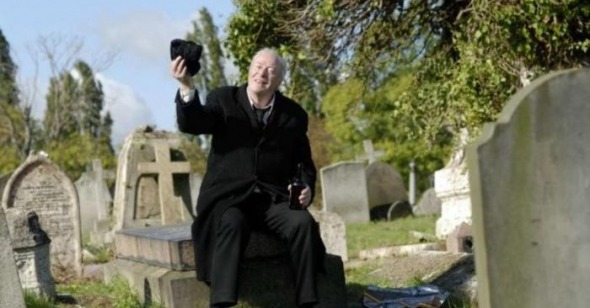This Is (Still?) England
by Leo Goldsmith
Is Anybody There?
Dir. John Crowley, U.K., Big Beach Films
Somewhere in the guidelines of Britain’s National Lottery, which partly funds the UK Film Council (and thus nearly every British film you’ve seen for the last decade), it must be written that no film will receive backing if it does not include at least one of the following: an adorable little boy; a score by former Divine Comedy composer/arranger Joby Talbot; a fond but miserablist depiction of England’s recent past; a venerable actor whose first name is “Sir.” It even seems that a sharp a social commentator as Shane Meadows is not exempt from these by-laws: a country whose principal cinematic exports used to be crafty spy thrillers, various Shakespeareana, disproportionately well-acted Hammer schlock, and Victorian costume romances now seems to be shipping over a limitless stock of grim yet coy bildungsromans featuring likeable little lads, jaunty music, and the chilly charms of pre-New Labor, pre-EU Britain.
Is Anybody There?, from television writer Peter Harness and Irish theater and television director John Crowley, continues this trend without any great innovation with the story (scored by Talbot) of an adorable boy growing up in the Southeast in the relentlessly dreary 1980s (pointlessly recreated with gag-ready fashions and haircuts and a glimpse of Back to the Future). But at the very least it does so properly—the child is Bill Milner of Hammer & Tongs’ smart and affectionate Son of Rambow (which out-classed Gondry’s rather offhand Be Kind Rewind almost the minute that film was released), and the “Sir” involved is Maurice Micklewhite, a.k.a. Sir Michael Caine.
As in Son of Rambow, Milner plays a somewhat isolated lad with quirky habits, here Edward, the mopey only child of a couple running a home for the elderly. Obsessed with the supernatural, Edward spends his rainy days seeking out paranormal activity at Lark Hall, scampering among its infirm occupants and waiting patiently for them to die so that he can record their last breath on his handheld tape recorder. Soon, retired magician Caine—the one-time “Amazing Clarence”—also finds himself reluctantly stationed at the home, situated amongst carping old bags, shaky war veterans, and doddering drunks. “Do you think you can bugger off?” barks Clarence at meddlesome, death-curious Edward, but before long (and rather predictably) the two strike up a redemptive and character-building partnership in misery. Edward distracts Clarence from grief-stricken thoughts of his long-lost love, and Clarence entertains the neglected Edward first by offering him fake ghost communications and teaching him magic.
The rhythms of this story, while ploddingly familiar, are made digestible by Caine’s rapport with Milner—not exceptional in itself, but credibly touching enough without being cloyingly sentimental. To Edward’s complaint that “I used to have my own room with Paddington Bear wallpaper,” Clarence responds, “Well, I used to have a beautiful wife and all my own teeth. Your life changes, buster.” Life-lessons and hard truths about aging, regret, and death are on offer in Is Anybody There?, but at least the film balances its moments of heart-warming with stabs of British wit and worriment. Rain, old age, suicide, dementia, and inadvertent amputation abound, and even as Clarence tries to help Edward “make contact with the living,” the film doesn’t shy from the magician’s own decrepitude, the failures of his life, and the slow creep of senility.
This temerity is admirable in Crowley’s film, and even if the film’s setup is by now quite conventional, a great supporting cast of young and old British actors (including Anne-Marie Duff and David Morrissey as Edward’s quarrelsome parents) carries some of its more contrived melodramatics. Thus, it’s simply a shame that, in spite of Caine’s name and a number of attributes besides, this film is likely to be lost among so many other British exports of the same ilk. The talent and craftsmanship of Is Anybody There? is ample, but it remains uncertain whether there’s anybody here still interested in this all-too-familiar story.
(This article originally appeared on indieWIRE.)
